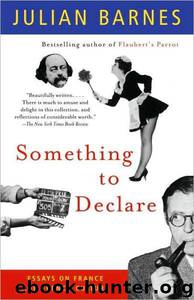Something to Declare by Julian Barnes

Author:Julian Barnes
Language: eng
Format: mobi, epub
Tags: Non-fiction, Travel, Writing
ISBN: 9780307547101
Publisher: Knopf
Published: 2001-01-02T00:00:00+00:00
It was a vain hope; and it would be little comfort to Flaubert that the disobedient pursuit of every detail of his life has on the whole been carried out by scholars and critics. They were, for him, the moral equivalent of bootboys and customs clerks; all his life he trawled their work for idiocies high and low to include in the “Copie” of Bouvard et Pécuchet.
Yet to a certain extent Flaubert might still be able to say today, “I have no biography.” There was no early fact-dredging, no tracking-down of the faithful servant, the reticent mistress, the garrulous supplier of cabbages. So the interpreters, the dreamers, and the wonky theorists got in there without the sifters and sorters having first done their business. The best biographers in English either stopped half-way (like Francis Steegmuller) or were too brief (like Philip Spencer).
Now comes Herbert Lottman, the diligent biographer of Camus. Pre-eminently a dredger and sifter, an archive-pounder and source-badgerer, Mr. Lottman arrives approximately a hundred years too late, yet still needed. He arranges the known facts about Flaubert's life, and the known opinions of his contemporaries, with an effi ciency that has not been seen before. As against this, he writes badly, translates awkwardly, has no apparent opinion on Flaubert's works, and has little feel for the nineteenth century; he alternates stretches of drab invisibility with outbursts of perkily certain judgement, and is often crassly up-to-date. When Flaubert gets the pox, Lottman comments pompously: “The modern reader will be struck by the absence of respect for personal prophylactics …” Given the messy history of Flaubertian biography, this book has a certain value. But its formidable irritations confirm that the chuckling curse Flaubert put on his biographers hasn't lost its power.
He was modern literature's archetypal rewriter; he told us that prose is like hair—it shines with combing. Mr. Lottman's text is a tangle of nits and knots, a flour-bomb of dandruff, a delta of split ends. Flaubert, to begin with (line one), isn't a great writer but “a seminal figure.” His family roots in Champagne are swiftly outlined—perhaps too swiftly, Lottman worries: “Indeed, we have hardly made this Champagne region seem attractive. It is a countryside of chalky soil whose perfect grape, when dealt with in a certain way, becomes that fizzy wine.” Gustave grew up in Rouen: “One would love to be able to see the world as this child saw it.” At the age of six or seven, he passed a recently-employed guillotine and saw bloodied cobbles: “Surely every child can call up at least one unbearable memory, even if guillotines and heads in baskets are harder to find now.” Later, his education began: “Gustave went to school during the tail end of romanticism, which explains how romanticism was able to enter the classroom.” And so on.
Having reassured the timid reader that champagne comes from Champagne, Lottman similarly tickets and dockets the French nineteenth-century literary scene. Les Fleurs du mal is an example of “the liveliest modern writing”; Musset
Download
This site does not store any files on its server. We only index and link to content provided by other sites. Please contact the content providers to delete copyright contents if any and email us, we'll remove relevant links or contents immediately.
Spell It Out by David Crystal(35813)
Underground: A Human History of the Worlds Beneath Our Feet by Will Hunt(11812)
A Year in the Merde by Stephen Clarke(5051)
Venice by Jan Morris(2403)
Claridge's: The Cookbook by Nail Martyn & Erickson Meredith(2240)
My Paris Kitchen: Recipes and Stories by Lebovitz David(2110)
A TIME OF GIFTS by Patrick Leigh Fermor(2084)
The Plantagenets by Dan Jones(1913)
Welcome to the Goddamn Ice Cube by Blair Braverman(1867)
Bang Poland: How To Make Love With Polish Girls In Poland by Roosh V(1838)
Top 10 Prague (EYEWITNESS TOP 10 TRAVEL GUIDES) by DK(1819)
From Russia with Lunch by David Smiedt(1784)
The Isle of Mull by Terry Marsh(1784)
The Finnish Way by Katja Pantzar(1783)
A TIME TO KEEP SILENCE by Patrick Leigh Fermor(1746)
Rick Steves London 2018 by Rick Steves & Gene Openshaw(1728)
A Taste of Paris by David Downie(1726)
Merde in Europe by Stephen Clarke(1654)
Insight Guides Experience Tokyo by Insight Guides(1644)
